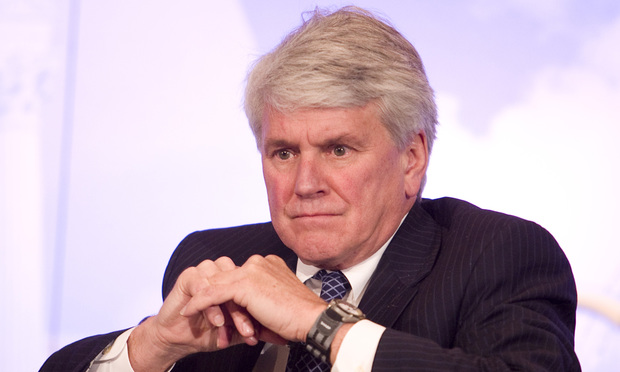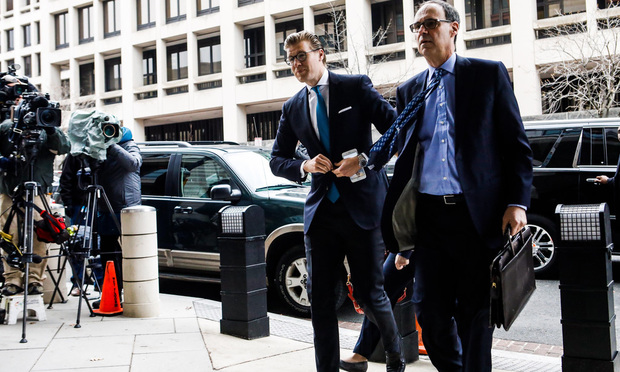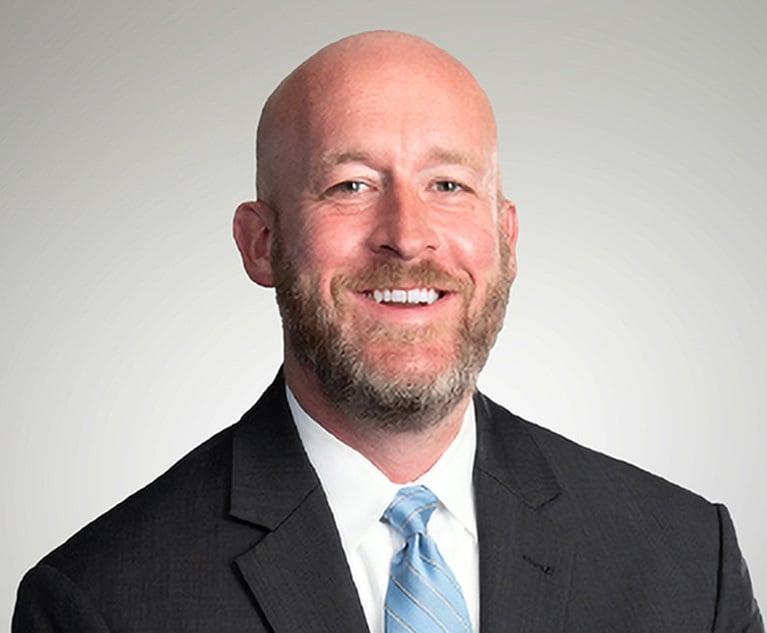At Greg Craig's Trial, Skadden Is Watching—And Testifying
A Skadden partner was the government's first witness, and several other Skadden lawyers could soon be called to the stand. The testimony offers a peek inside the firm, where Gregory Craig formerly was a partner.
August 15, 2019 at 08:31 PM
7 minute read
The original version of this story was published on National Law Journal
 Gregory Craig. Credit: Diego M. Radzinschi / NLJ
Gregory Craig. Credit: Diego M. Radzinschi / NLJ
After paying $4.6 million in January to resolve allegations connected to its work for Ukraine, the law firm Skadden, Arps, Slate, Meagher & Flom stayed largely silent as one of its former partners, Greg Craig, a former top lawyer in the Obama administration, stared down charges connected to that contract.
As Craig’s trial gets underway in Washington, Skadden is closely watching the action—and testifying. One of the firm’s partners, Michael Loucks, a former U.S. attorney for Massachusetts, was called as the first witness for the government.
Meanwhile, two Gibson, Dunn & Crutcher partners, Jeff Rosen and Stuart Delery, monitored the proceeding for Skadden and were seen speaking with Loucks before he took the stand. Delery, a top Obama-era Justice Department lawyer, had attended hearings leading up to the trial.
For about an hour Thursday, prosecutor Fernando Campoamor-Sanchez questioned Loucks about his role on a project at the core of the government’s case against Craig: A report Skadden prepared in 2012 for Ukraine examining the prosecution of Yulia Tymoshenko, a former prime minister and political rival of the country’s president at the time, Viktor Yanukovych. Craig was the lead attorney on the project.
Craig was charged in April with misleading the Justice Department about his role in the public release of that report to avoid the perceived stigma of registering as a foreign agent. Prosecutors have alleged that Craig avoided the disclosure requirements of the Foreign Agents Registration Act, or FARA, also to conceal the identity of the report’s then-silent financial backer: the Ukrainian steel magnate Victor Pinchuk.
Loucks had worked closely with Craig on the Tymoshenko report and traveled repeatedly to Kiev. Campoamor-Sanchez used his questioning to underscore how the purportedly independent review of Tymoshenko’s prosecution played into Ukraine’s goal of improving its global image in 2012, as the country saw its hopes of joining the European Union hampered by criticism that the case was politically-motivated.
Reviewing emails from 2012, Loucks discussed how the firm had suggested a public relations firm, FTI Consulting, to Ukraine and also recalled the extensive media coverage of Tymoshenko’s case.
“We were only there because there was a lot of bad press about it,” Loucks said.
Loucks identified the Skadden team that helped prepare the Tymoshenko report, naming Craig, Cliff Sloan, Matthew Cowie, Alex Haskell and Alexander van der Zwaan as the prosecutor displayed their photographs of them on a monitor in the courtroom. Of that group, Loucks is the only one who remains at Skadden.
Craig retired last year amid the scrutiny of his work on the Ukraine report, and Sloan, a former Skadden partner, left this year for a post at Georgetown Law Center.
Haskell, a former Skadden associate, became a counsel for Democrats on the Senate Judiciary Committee last year, and Cowie, a former counsel at the firm, jumped to Dechert LLP in 2016. Van der Zwaan, who had been an associate, pleaded guilty last year to lying to the special counsel and was sentenced to 30 days in jail. He later lost his law license in the U.K.
 Former Skadden associate Alex Van der Zwaan, left, arrives for his sentencing at federal court in Washington on April 3, 2018 with his lawyer William Schwartz of Cooley. Credit: Diego M. Radzinschi / NLJ
Former Skadden associate Alex Van der Zwaan, left, arrives for his sentencing at federal court in Washington on April 3, 2018 with his lawyer William Schwartz of Cooley. Credit: Diego M. Radzinschi / NLJIn his testimony, Loucks said Van der Zwaan was “very fluent in Ukrainian” and helpful in arranging meetings in Kiev for the Skadden team. He recalled agreeing to help prepare the report but said he did not know Craig well at the time.
“The culture at Skadden is you say ‘yes,’” he said.
When asked whether he had inquired about how Skadden was being paid, Loucks said it was not a question he asks of partners who want to bring him onto assignments, “regardless of who it is.” But Loucks said he was dubious of Ukraine’s public claim that it was paying $12,000 for the report—a purported amount that met skepticism in the Ukrainian media. Skadden was, in fact, paid $4 million.
“I didn’t think we were doing it for $12,000, but I don’t remember discussions about the amount,” Loucks said.
Loucks said he did recall discussions about whether Skadden needed to register as a foreign agent in connection with its Ukraine deal. “I accepted what Mr. Craig told me, which was that it was structured in a way that did not require us to register,” Loucks testified.
Later, Loucks said he was not made aware in 2013 of the Justice Department’s inquiry into whether Skadden needed to register under FARA. Loucks will return to court Friday for cross-examination.
 William Taylor III, of Zuckerman Spaeder. Photo by Diego M. Radzinschi/ALM
William Taylor III, of Zuckerman Spaeder. Photo by Diego M. Radzinschi/ALMHis testimony came soon after opening statements from prosecutor Molly Gaston and Craig’s lead defense lawyer, Zuckerman Spaeder partner William Taylor. The two lawyers delivered dueling narratives of Craig’s involvement in the public relations efforts for the Tymoshenko report.
Gaston told jurors that, when the Justice Department inquired about Craig’s contacts with reporters, he had the choice of telling the truth or concealing the full extent of his efforts.
“We are here today because the defendant chose to lie and conceal,” Gaston said.
“He lied. He told the FARA unit half-truths,” she added, referring to the team tasked with enforcing the disclosure law. “And he concealed the facts of what he had done. That is why we are here today.”
Taylor highlighted Craig’s service in the Clinton and Obama administrations, describing him as an “honorable man” who agreed to examine Tymoshenko’s prosecution on the condition that his report be independent. “He was not signing up to do some kind of whitewash,” Taylor said.
Taylor said Craig was not advancing Ukraine’s public relations efforts but instead counteracting the country’s attempt to spin the Tymoshenko report.
“It’s not an exaggeration to say that, when Mr. Craig saw the talking points, he basically erupted,” Taylor said.
Describing the report’s conclusions as “enormously damaging” to Ukraine, Taylor said Craig was motivated to speak with reporters to protect his reputation and ensure that new organizations covering the report “got it right.”
Skadden’s civil penalty, and its subsequent registration for the Ukraine work, are not expected to be discussed at the trial, which is expected to last two weeks. Skadden’s general counsel, Lawrence Spiegel, and Kenneth Gross, a partner with FARA expertise, are among the other possible witnesses for the prosecution.
U.S. District Judge Amy Berman Jackson said she is hopeful each day of the trial will begin at 9:30 a.m. and end between 4:30 p.m. and 5 p.m. Breakfast, she said, would be awaiting jurors.
“I would call it, loosely, a continental breakfast,” she said. “There will not be an omelette maker.”
Read more:
Cliff Sloan, Longtime Skadden Partner, Leaves Firm for Georgetown Law
Ex-Skadden Associate Gets 30-Day Jail Sentence for Lying to Mueller’s Team
Skadden’s Foreign-Lobbying Settlement Is Off-Limits at Greg Craig’s Trial
Mueller’s Interest in Skadden Presents Unique Crisis Management Challenge
Registering as a ‘Foreign Agent’? Why Law Firms and Lobby Shops Might Demur.
This content has been archived. It is available through our partners, LexisNexis® and Bloomberg Law.
To view this content, please continue to their sites.
Not a Lexis Subscriber?
Subscribe Now
Not a Bloomberg Law Subscriber?
Subscribe Now
NOT FOR REPRINT
© 2025 ALM Global, LLC, All Rights Reserved. Request academic re-use from www.copyright.com. All other uses, submit a request to [email protected]. For more information visit Asset & Logo Licensing.
You Might Like
View All
Beyond Borders: Baker McKenzie Attorneys Stress the Need for a Global Outlook Cybersecurity and Data Privacy Matters

Snell & Wilmer's Andrew Young and the Case of the FBI's Secret Encrypted Phone Company

How One of the World's Largest Institutional Investors Approaches Litigation

Trick or Treat? How an Office Halloween Party Convo Led to a Quinn Associate's Appellate Argument
Trending Stories
- 1How I Made Office Managing Partner: 'Always Be Willing to Work Harder Than the Person Next to You,' Says Esther Cho of Stradley Ronon
- 2People in the News—Feb. 10, 2025—Flaster Greenberg, Tucker Arensberg
- 3The Support Center for Child Advocates Welcomes New Executive Director
- 4'Shame on Us': Lawyer Hits Hard After Judge's Suicide
- 5Upholding the Integrity of the Rule of Law Amid Trump 2.0
Who Got The Work
J. Brugh Lower of Gibbons has entered an appearance for industrial equipment supplier Devco Corporation in a pending trademark infringement lawsuit. The suit, accusing the defendant of selling knock-off Graco products, was filed Dec. 18 in New Jersey District Court by Rivkin Radler on behalf of Graco Inc. and Graco Minnesota. The case, assigned to U.S. District Judge Zahid N. Quraishi, is 3:24-cv-11294, Graco Inc. et al v. Devco Corporation.
Who Got The Work
Rebecca Maller-Stein and Kent A. Yalowitz of Arnold & Porter Kaye Scholer have entered their appearances for Hanaco Venture Capital and its executives, Lior Prosor and David Frankel, in a pending securities lawsuit. The action, filed on Dec. 24 in New York Southern District Court by Zell, Aron & Co. on behalf of Goldeneye Advisors, accuses the defendants of negligently and fraudulently managing the plaintiff's $1 million investment. The case, assigned to U.S. District Judge Vernon S. Broderick, is 1:24-cv-09918, Goldeneye Advisors, LLC v. Hanaco Venture Capital, Ltd. et al.
Who Got The Work
Attorneys from A&O Shearman has stepped in as defense counsel for Toronto-Dominion Bank and other defendants in a pending securities class action. The suit, filed Dec. 11 in New York Southern District Court by Bleichmar Fonti & Auld, accuses the defendants of concealing the bank's 'pervasive' deficiencies in regards to its compliance with the Bank Secrecy Act and the quality of its anti-money laundering controls. The case, assigned to U.S. District Judge Arun Subramanian, is 1:24-cv-09445, Gonzalez v. The Toronto-Dominion Bank et al.
Who Got The Work
Crown Castle International, a Pennsylvania company providing shared communications infrastructure, has turned to Luke D. Wolf of Gordon Rees Scully Mansukhani to fend off a pending breach-of-contract lawsuit. The court action, filed Nov. 25 in Michigan Eastern District Court by Hooper Hathaway PC on behalf of The Town Residences LLC, accuses Crown Castle of failing to transfer approximately $30,000 in utility payments from T-Mobile in breach of a roof-top lease and assignment agreement. The case, assigned to U.S. District Judge Susan K. Declercq, is 2:24-cv-13131, The Town Residences LLC v. T-Mobile US, Inc. et al.
Who Got The Work
Wilfred P. Coronato and Daniel M. Schwartz of McCarter & English have stepped in as defense counsel to Electrolux Home Products Inc. in a pending product liability lawsuit. The court action, filed Nov. 26 in New York Eastern District Court by Poulos Lopiccolo PC and Nagel Rice LLP on behalf of David Stern, alleges that the defendant's refrigerators’ drawers and shelving repeatedly break and fall apart within months after purchase. The case, assigned to U.S. District Judge Joan M. Azrack, is 2:24-cv-08204, Stern v. Electrolux Home Products, Inc.
Featured Firms
Law Offices of Gary Martin Hays & Associates, P.C.
(470) 294-1674
Law Offices of Mark E. Salomone
(857) 444-6468
Smith & Hassler
(713) 739-1250






